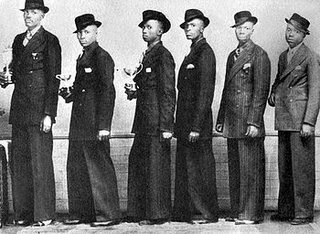
The South African recording industry was born in the 1930s with the establishment of the long running Gallo records formed by Eric Gallo. The company included subsidiaries such as Trek, Unika, GRC, Meteor, Teal and Trutone. The National Party was the ruling party during the 30’s and they very much favored separation of races, residential segregation and control of Africans' entry into urban areas. After the Wall Street crash in America the world suffered great economic depression. South African farmers were badly hit by the great depression and many other white South Africans- predominantly Afrikaners were reduced to poverty. South Africa then abandoned the Gold Standard in 1933 in order to curb the economic effects of the depression. This restored the higher price for gold, which in turn restored the prosperity of the mines which led to economic improvements in the country. This era also saw the rise of Afrikaner nationalism. In 1938, the centenary of the voortrekkers victory over the Zulu offered an opportunity for the Broederbond and FAK to organise a symbolic ox wagon trek across the country to Pretoria to win the support of fellow Afrikaners in created unity among all Afrikaners and to contribte funds to a deed to save the nation.
Solomon Linda and The Evening Birds
Mbube
While the rest of the world was making a big woo-ha about the first helicopter, Bonny & Clyde, air-conditioning and the Nazi’s launching their first concentration camp, the U.S. singing its first national anthem officially, South Africa was singing a new tune of ‘Mbube’: Zulu for Lion. This Zulu Accapella style of singing with its antiphonal harmonies is the early roots of Isqathamiya and was popularized by Solomon Linda and the Original Evening Birds. Mbube was developed from singing and dancing competitions that used to be staged at all-male hostels where migrant workers were impounded. The genre’s performance formation – which would become its basic structure – included an upper register vocal lead backed by a bass-dominated four-part harmony. Linda’s composition ‘Imbube’ is one of the most sampled and remade songs in the world and the first African recording to sell double platinum (100,000 units).
BUY IMBUBE BY SOLOMON LINDA AND THE EVENING BIRDS
LISTEN TO IMBUBE BY SOLOMON LINDA AND THE EVENING BIRDS
No comments:
Post a Comment